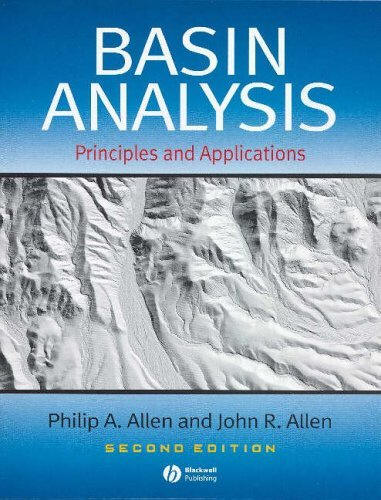Basin Analysis Geology 4131
Fall 2012
Juan M. Lorenzo
Department of Geology and Geophysics
Lecture times Tuesdays and Thursdays 12.00 -1.30 p.m. Room E131 Howe-Russell Building Office hours Room 215 (Old Howe-Russell Building) Tuesdays and Thursdays after class. To make appointments: e-mail: gllore@lsu.edu or phone 578-4249
Required lecture textbook:

Basin Analysis, Principles & Applications by Philip A. Allen and John R. Allen 2nd Edition (2005)
Aims:
To introduce the study of basin evolution in terms of (1) quantifiable tectonic processes (2) and sedimentologic models with some application to economic exploration. This course is certified as a “Communication-Intensive Course” and meets all of the requirements explained on the CxC Web site: http://cxc.lsu.edu., including the following: Emphases on formal and informal assignments in written and visual communication, class time spent on communication, 40% of the final grade based on communication projects, revisions after faculty feedback on 2 formal projects (one for each emphasis), and a student/faculty ratio of 35:1. Because it meets these requirements, students may count it toward “Distinguished Communicator” certification on LSU transcripts.
Project description and Example
AUGUST
Lectures Tue 26 Introduction to the Course Poll
Thu 28 Plate Tectonics and Basin Classification (*.ppt ) Please read Project description and Example
Please Read Chapter 1
Paper to read for homework #1
SEPTEMBER
Lectures Tue 2 cancelled-Hurricane Gustav
Thu 4 cancelled-Hurricane Gustav Tue 9
Thu 11 Lithospheric Mechanics (*.pptx) Classification essay due
Chapter 2; Example projects
Isostasy homework given out
Isostasy Answer sheets
Tue 16 Lithospheric Mechanics (*.pptx)
Thu 18 Lithospheric Mechanics (*.pptx) Chapter 2 & Readings Tue 23 Lithospheric Mechanics (*.pptx) Thu 25 Potential speaker-Erik Scott from Marathon
Isostasy homework due
Project outline and research references due
Tue 30 Lithospheric Mechanics (*.pptx)
Compare and contrast Watts and Burov vs. Jackson's models. 1 page
Project Meetings week
OCTOBER
Lectures Thu 2
Tue 7 GSA,GCAGS Houston, 5-9
Chapter 3
Thu 9 Basins caused by stretching Creme Brulee vs. Jelly sandwich homework due
Lab interpretation of Passive margin hand outTue 14 Passive margin hand out - calculate crustal thickness
Thu 16 Basins caused by stretching
Tue 21 Basins caused by stretching Crustal thickness handout due Thu 23 Colleen Fava from CxC will speak on: Effective Technical Writing
Tue 28 Mid-term Exam
Thu 30
NOVEMBER
Lectures Tue 4 Continental basins affected by flexure
Chapter 4 example of simple flexural modeling programs (.sit file)
First Submission of Course Project Due
Thu 6 Matlab flexure LAB
Tue 11 SEG, Las Vegas, 9-14
Thu 13
Tue 18 Chapter 7 Last Homework
Paper on modeling denudation
Thu 20 Colleen Fava from CxC will speak on: Effective PowerPoint Presentations techniques
Chapter 8 Reservoir Architecture, Depositional Facies and Geophysical Response of Pay intervals
Tue 25 Chapter 9 Porosity in backstripping; matlab code Project Presentation Meetings Thu 27
DECEMBER
Lectures Tue 2 Project Presentations Last Homework due Thu 4 Project Presentations Written project presentation due no later than 3.30 p.m. Leave in mailbox (E235 Howe-Russell) or e-mail.
AGU, San Francisco, 15-19
Recommended Pre-requisites: understanding of basic structural geology, basic stratigraphy, algebra, trigonometry, basic PC/Mac manipulation, Web navigation using freeware browser.
Course Grades: Final letter grades are calculated using the results of two-to-four (2-4) lab exercises (40%), a midterm exam (20%),and a course project (20% written and 20% oral). A (90-100%) , B (80-89.5%), C (60-79.5%) D (50-59.5%), F (less than 49.5%) Graduate students taking this course will be held to a higher standard, commensurate with their academic seniority.